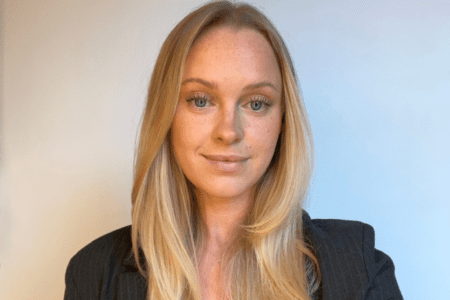
When you study abroad, you usually go at it alone. Maybe if you’re lucky, a friend or two comes along.
But for Shambhavi Polavarapu from Telangana in Southern India, the experience was a little different. She was only 17 when she left home for Australia.
Forget living alone, she suddenly found herself with not one, but four guardians looking out for her. But it wasn’t stifling at all.
Deakin University set her up with a great international student homestay and she spent her first four months there surrounded by warmth, care, and support.

At Deakin, Sham participated in many cybersecurity workshops. Source: Shambhavi Polavarapu
‘Tech makes my heart beat, I completely fell in love’
Sham has always been a tech kid. Back in 9th grade, she won awards for her human recognition virtual pet robot.
In 11th and 12th grade, she took Information Practices at school and learned Python, SQL data analysis, HTML, and web development. And she crushed the class, scoring 98%.
She joined her school’s IT committee, hackathons, and a tech workshop at Birla Institute of Technology and Science, Pilani (BITS Pilani), a top private university in India as well.
It was in 12th grade when Sham realised going into IT, specifically cybersecurity, was her calling. One of her close relatives was a victim of a cyberattack and lost a lot of their savings.
“As amazing as the Internet and us being connected is, it has its vulnerabilities,” she says. “I know I can’t protect everyone, but maybe I can make a difference in at least one person’s life.”
Thankfully, she had her dad — her “biggest supporter” — by her side. He encouraged her to study abroad and helped her research universities across the US, UK, Europe, and Australia.
When they found Deakin University, he took charge of the visa paperwork and admissions, making sure she had everything she needed to take the next step.

Sham got to attend many industry events in Melbourne, including the Education Summit at Google. Source: Shambhavi Polavarapu
Out into the world at 17
Leaving her family to study at Deakin University came with many firsts.
Sham has been in the same state for 17 years. She’s never done international trips. She’s never had a foreign visa.
But is it possible to study abroad when you’re under 18?
“A lot of universities are iffy about taking in minors,” she explains. “There’s so much extra responsibility.”
Universities have to arrange an international student homestay, a legal guardian, and more. In Sham’s case, she needed someone to pick her up and drop her off at school.
Many do not want the hassle, but Deakin University was different. “They were the most supportive out of all my options. I felt at home even before I got there.”

Living in an international student homestay gave Sham a great start. One of her first memories? Meeting Dexter the Dragon at Deakin’s orientation. Source: Shambhavi Polavarapu
What is an international student homestay in Australia like?
An international student homestay is a living arrangement where a student from abroad stays with a local family during their studies.
Australia has strict welfare and custody requirements for students under 18. Deakin University has its own set of guidelines too.
That’s why, when Sham arrived in Australia, everything had been arranged well in advance. Through the Australian Homestay Network, she was matched with Effie Adams and her daughter.
They welcomed her into their home for four months until she turned 18.
Alongside her international student homestay family, Sham also had:
- A university guardian
- A university caretaker
- A Personal Care Services (PCS) caretaker
She connected with her international student homestay family the most. “I was expecting only the bare minimum, like a room with a desk and a bed,” she says.
But Adams took care of her like a mom. She made her three meals a day, did her laundry, and let her use the TV, sound system, and home gym whenever she liked.
“It felt like I was being looked after by older women, which meant so much as I was away from my mom for the first time,” Sham shares.
“That kind of support changed everything. Deakin did such a great job matching me with them for my international student homestay.”

Sham’s first time on campus after settling into her international student homestay. Source: Shambhavi Polavarapu
The highs and lows of studying abroad in Australia
Sham’s first four months in Australia were a rollercoaster.
She had arrived full of excitement, but loneliness soon crept in. “Something you don’t realise when you move to Australia is that people don’t actually care about what you do,” she says.
In India, for example, if Sham went out for a walk, people would stare and call her “scandalous.” But in Australia, no one bats an eye.
That shift was liberating. At first, she couldn’t even go out if she didn’t have make up on or if she was in her pyjamas.
But adjusting to a new culture, and not having her family nearby took a toll. Sham found herself overwhelmed and had many depressive episodes where she couldn’t get out of bed.
As time passed, she realised this was normal. Every international student faces this loneliness in some form.
“I just decided to have fun,” she says. “Only time can really teach you how to get through that part. Eventually, I found my community. And now, I’ve never been happier.”

Sham’s also helped out at an Avalon show — a fun and unique experience. Source: Shambhavi Polavarapu
Advice for minors interested in studying abroad
1. Don’t be afraid to ask for help
At first, Sham felt like she was the only one struggling. But when the loneliness became too much, she decided to talk to one of her caretakers.
They responded by arranging meetups with other under 18 students. Together, they talked about how they were feeling:
- How are you coping with things?
- What’s it like being so far from home?
- How’s your adjustment to Australia going?
Those simple conversations helped Sham feel like she wasn’t alone and had a community around her.
2. Prepare yourself mentally
One of the most helpful things you can do before moving abroad? Prepare yourself mentally.
“It’s not going to be smooth in the beginning,” Sham says. “Things will be bumpy, and that’s okay.”
She believes that accepting this from the start makes a huge difference. “I told myself, ‘I might struggle at first, but I’m ready. I can take it. This won’t last forever.’”
3. Take care of yourself
When adjusting to a new country, it’s easy to neglect yourself. But that’s a big no for Sham.
“Take care of your health. Eat on time. Drink water,” she says.
She also encourages students to avoid isolating themselves. “Don’t just stay locked up in your room,” she says. “Put in the effort to talk to people around you. It really helps.”










